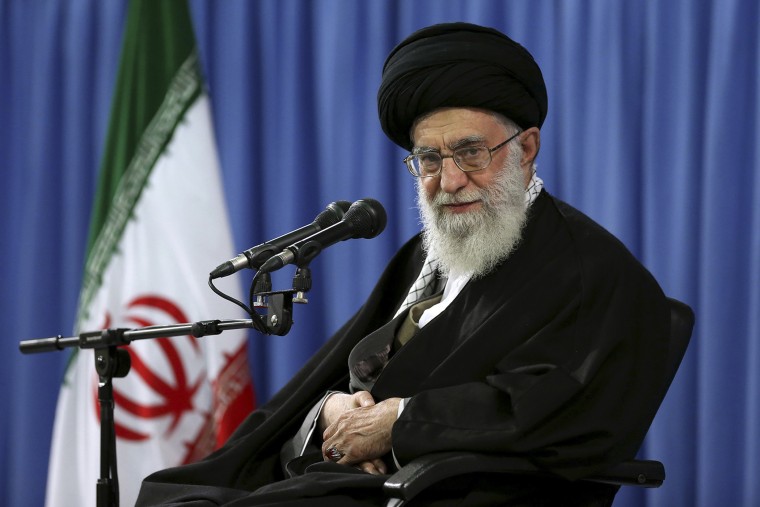TEHRAN — It took Iran's Ayatollah, an Arab sultan, secret letters, and an American college connection to help seal the historic deal between Iran and the United States, according to a senior Iranian negotiator.
Ali Akbar Salehi, the energetic, English-speaking head of Iran's Atomic Energy Organization, told NBC News in Tehran how the deal unfolded from Iran's perspective, revealing for the first time some of his country's calculations, preconditions and continued mistrust of Washington.
Salehi, who is also one of Iran's vice presidents, said the country's supreme leader, the Ayatollah Ali Khameini, was involved at every step of the way in the secret so-called "second track" with Washington.
"Without the supreme leader, we were not able to start the second track. That is for sure," he said.
RELATED: What will Iran do with new economic freedom?
Salehi says Washington initiated the dialogue, indirectly at first, through a businessman from the tiny Arab sultanate of Oman. Oman, governed by Sultan Qaboos bin Said for decades, has become a kind of Switzerland of Arabia, a neutral place where enemies can meet in private to broker deals away from prying eyes and the media. But Salehi says he wanted more than just the word of a middleman before going to his boss, the supreme leader, to propose something as important as negotiations with Washington over the nuclear program. Enter the sultan.
"I said, 'Look, we have to receive an official letter from the Omanis that would give us the assurance that this is a serious proposal. Otherwise, we cannot just rely on (the) verbal note of a person,'" he said. "So the sultan of Oman wrote a letter to our supreme leader, expressing the fact that the U.S. is ready to enter into negotiation with Iran on a bilateral basis, or a second track, you may say. And then, I submitted the letter to the leader, and then I discussed the issue with him. And, yes, he said, 'Okay, I agree that you start this second track. But you have to take four conditions into consideration.'"
Iran's conditions
Salehi said the supreme leader's four conditions limited how far the negotiators were able to go in their talks with Washington.
"One condition was that, 'Look, you just discuss the nuclear issue. You do not enter into any other issue. I mean, no political negotiations. It's only nuclear issue negotiation.'"
The second condition, he said, was for the talks to be quick, and not drag on "lethargically."
"The third condition was that they (Washington) will have to recognize our basic right, which is enrichment. And the fourth condition was a condition that, let's keep it for ourselves."
When pressed, Salehi said the fourth condition was "procedural," but provided no further details.
Personal bonds and college connections
Much has been reported about the personal relationship that developed between Secretary of State John Kerry and Iran's Foreign Minister Javad Zarif, but it wasn't the only personal relationship that mattered. Salehi was Iran's chief technical nuclear negotiator. His American counterpoint was Energy Secretary Ernest Moniz, who was taught at MIT when Salahi was a student there, though the two men did not know each other at the time.
RELATED: Iran's path forward as it starts to re-engage
"But later, when we met each other for the first time," Salahi recalled, they discovered that they had friends in common, "and they had told him about me." It was, he said, "as if we knew each other."
"Had it not been the case that me (and) Professor Moniz were in the negotiation, it would have been very difficult for experts to make decisions," he said.
The two scientists could discuss both the specific safeguards Washington wanted to place on Iran's nuclear program and the specific facilities that Iran wanted to keep.
"He (Moniz) was a very rational person, wise person. Of course, he was looking for his own national interest, as I was looking for my own national interest," Salehi said.
Mistrust and accusations
The negotiations over Iran's nuclear program culminated with smiling press announcements from Kerry and Zarif in Vienna earlier this month, but this didn't all happen peacefully. There's blood on the ground too.
Five photographs are prominently displayed on the wall of Salahi's Tehran office. The quiet, soft spoken man, who speaks fluent, barely accented English, became emotional when he showed them to us, his voice instantly hardening.
The photographs are of four nuclear scientists and a driver murdered in Tehran in an effort to sabotage Iran's nuclear program. Salehi blamed Israel for the murders but says Washington shares the responsibility.
"We have all the information that it was the Zionist regime," he said. "But there is — there was — a tacit, we think, agreement from the United States as well, unfortunately."
U.S. officials have denied involvement in the killings. Israeli officials have not confirmed the country's involvement, but expressed satisfaction that the Iranian nuclear scientists were killed.
Asked if he expected a sixth photograph on his wall, Salehi showed a passion previously hidden behind his relaxed demeanor.
"I hope it's me. I hope it's me," he said. "Because this is a source of pride, I told you. We look for martyrdom. We are not frightened of that."
This article was originally published on NBCNews.com.
